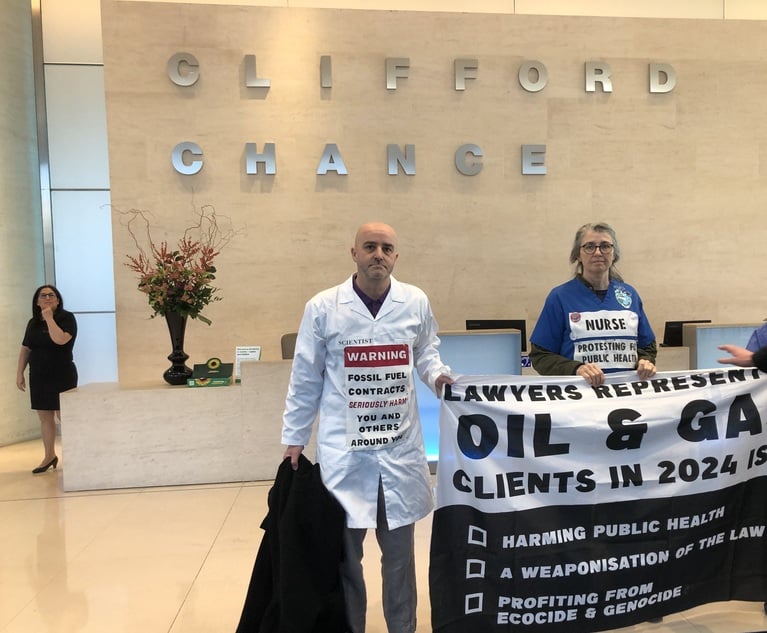 Greg Nitzkowski, Paul Hastings. Photo: Jason Doiy/ALM
Greg Nitzkowski, Paul Hastings. Photo: Jason Doiy/ALMDivesting Data Analytics Team Was Always in the Cards, Says Paul Hastings Leader
While the sale may have been a possibility for years, for buyer UnitedLex, there's no precedent for acquiring a new technology.
June 10, 2020 at 05:00 PM
4 minute read
The original version of this story was published on The American Lawyer
UnitedLex's deal to acquire Paul Hastings' data analytics team, which closed Tuesday, took nine months to get from the first meeting between the parties to the finish line. But the seeds of the transaction go back much further.
According to Paul Hastings co-managing partner Greg Nitzkowski, from the day the firm decided to invest in data science and artificial intelligence, it foresaw a point in the future when it would make sense to unload the unit.
"When we asked Tom Barnett to join and build the team, we were already talking about this possibility that came to fruition yesterday," he said. "The goal was not to confer a long-term competitive advantage to us around a proprietary set of tools. We didn't see any examples of that in a law firm."
Instead, the motivation for the investment was to help train the firm's lawyers to work in concert with data scientists and give them the skills necessary to leverage technology on behalf of their clients. This should give the firm a competitive edge over its rivals, Nitzkowski explained.
Now, the team's 20 members, who, like Barnett, formally made the jump to UnitedLex on Tuesday, will continue to work with Paul Hastings on advisory matters as a third-party provider.
"We're committed to Paul Hastings as being an incubator for new technology, new processes, new offerings," said UnitedLex partner David Deppe. "They want to actively develop for us."
But the unit will also market its services to other law firms and corporate legal departments.
That's one reason why Paul Hastings eschewed the initial proposal that Barnett proposed six years ago of establishing the unit as a wholly-owned subsidiary: the concern that conflicts would impede the wider deployment of any products it developed. Another worry was the challenges that law firms, with structural impediments to retaining earnings, have in committing to long-range investments in technology-driven proprietary technology.
"We thought it would be better to fully integrate the team and then have a broad understanding of what an exit strategy would look like," said Nitzkowski, who is based in Los Angeles. He emphasized that along the way, the group hit all of its financial markers.
UnitedLex first learned about the acquisition opportunity when it showed up in a bankers' deck outlining potential deals. Barnett, whose new role is senior vice president and divisional general counsel at UnitedLex, had been shopping it to several other potential acquirers. Then, a mutual friend who thought UnitedLex would make the best fit made a formal introduction, Deppe explained.
"We met in the Los Angeles office. We hit it off immediately," he said. "We could tell from that time that they really ran this function like a business. They had the proper financials and P&L statements."
Meanwhile, UnitedLex had never completed a straight-ahead acquisition before. Previous deals—like the ill-fated legal services outsourcing arrangement with LeClairRyan, and more recent litigation technology-focused contracts with Polsinelli and Ashurst—were structured more as strategic or managed-services partnerships.
"We actually acquired an asset here," Deppe said of the code developed by the Paul Hastings team. Neither Deppe nor Nitzkowski would comment on the financial terms of the agreement.
And while the technology remains usable today, just as it existed under Paul Hastings' umbrella, the next step for UnitedLex is to integrate the code into its Questio platform for eDiscovery and data management, which it launched in 2013. The company has committed to three "development sprints" aimed at having the code modularized within Questio in the coming months.
That follows nine months of exhaustive negotiations, which were slightly complicated by the coronavirus crisis.
"We really didn't experience probably more than a couple of weeks of delay due to COVID-19," Deppe said. "This is the first time I'd ever done anything like this virtually."
|
Read More
Polsinelli, UnitedLex Deepen Alliance With New IP Joint Venture
This content has been archived. It is available through our partners, LexisNexis® and Bloomberg Law.
To view this content, please continue to their sites.
Not a Lexis Subscriber?
Subscribe Now
Not a Bloomberg Law Subscriber?
Subscribe Now
NOT FOR REPRINT
© 2024 ALM Global, LLC, All Rights Reserved. Request academic re-use from www.copyright.com. All other uses, submit a request to [email protected]. For more information visit Asset & Logo Licensing.
You Might Like
View All


Doctors and Scientists Lead Climate Protests at Each Magic Circle Firm

Law Firms Mentioned
Trending Stories
Who Got The Work
Michael G. Bongiorno, Andrew Scott Dulberg and Elizabeth E. Driscoll from Wilmer Cutler Pickering Hale and Dorr have stepped in to represent Symbotic Inc., an A.I.-enabled technology platform that focuses on increasing supply chain efficiency, and other defendants in a pending shareholder derivative lawsuit. The case, filed Oct. 2 in Massachusetts District Court by the Brown Law Firm on behalf of Stephen Austen, accuses certain officers and directors of misleading investors in regard to Symbotic's potential for margin growth by failing to disclose that the company was not equipped to timely deploy its systems or manage expenses through project delays. The case, assigned to U.S. District Judge Nathaniel M. Gorton, is 1:24-cv-12522, Austen v. Cohen et al.
Who Got The Work
Edmund Polubinski and Marie Killmond of Davis Polk & Wardwell have entered appearances for data platform software development company MongoDB and other defendants in a pending shareholder derivative lawsuit. The action, filed Oct. 7 in New York Southern District Court by the Brown Law Firm, accuses the company's directors and/or officers of falsely expressing confidence in the company’s restructuring of its sales incentive plan and downplaying the severity of decreases in its upfront commitments. The case is 1:24-cv-07594, Roy v. Ittycheria et al.
Who Got The Work
Amy O. Bruchs and Kurt F. Ellison of Michael Best & Friedrich have entered appearances for Epic Systems Corp. in a pending employment discrimination lawsuit. The suit was filed Sept. 7 in Wisconsin Western District Court by Levine Eisberner LLC and Siri & Glimstad on behalf of a project manager who claims that he was wrongfully terminated after applying for a religious exemption to the defendant's COVID-19 vaccine mandate. The case, assigned to U.S. Magistrate Judge Anita Marie Boor, is 3:24-cv-00630, Secker, Nathan v. Epic Systems Corporation.
Who Got The Work
David X. Sullivan, Thomas J. Finn and Gregory A. Hall from McCarter & English have entered appearances for Sunrun Installation Services in a pending civil rights lawsuit. The complaint was filed Sept. 4 in Connecticut District Court by attorney Robert M. Berke on behalf of former employee George Edward Steins, who was arrested and charged with employing an unregistered home improvement salesperson. The complaint alleges that had Sunrun informed the Connecticut Department of Consumer Protection that the plaintiff's employment had ended in 2017 and that he no longer held Sunrun's home improvement contractor license, he would not have been hit with charges, which were dismissed in May 2024. The case, assigned to U.S. District Judge Jeffrey A. Meyer, is 3:24-cv-01423, Steins v. Sunrun, Inc. et al.
Who Got The Work
Greenberg Traurig shareholder Joshua L. Raskin has entered an appearance for boohoo.com UK Ltd. in a pending patent infringement lawsuit. The suit, filed Sept. 3 in Texas Eastern District Court by Rozier Hardt McDonough on behalf of Alto Dynamics, asserts five patents related to an online shopping platform. The case, assigned to U.S. District Judge Rodney Gilstrap, is 2:24-cv-00719, Alto Dynamics, LLC v. boohoo.com UK Limited.
Featured Firms
Law Offices of Gary Martin Hays & Associates, P.C.
(470) 294-1674
Law Offices of Mark E. Salomone
(857) 444-6468
Smith & Hassler
(713) 739-1250









